| Srl | Item |
| 1 |
ID:
065702
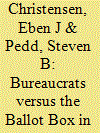

|
|
|
| 2 |
ID:
065699
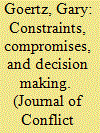

|
|
|
| 3 |
ID:
065704
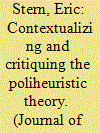

|
|
|
| 4 |
ID:
131054
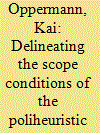

|
|
|
|
|
| Publication |
2014.
|
| Summary/Abstract |
The poliheuristic theory of foreign policy decision making would benefit from being clearer in spelling out the conditions under which it holds more or less analytic promise. The article makes the case that the concept of issue salience can help the theory address its shortcomings in this respect. In particular, the explanatory power of poliheuristic theory's two-stage model largely depends on the noncompensatory principle of major domestic political loss avoidance on the first stage of the model to simplify the choice set to be considered on the second stage. This is more likely to happen, however, in the case of issues that are highly salient to a government's selectorate than in the case of issues that are of low salience in the domestic arena. The poliheuristic theory should thus be more powerful if it is applied to domestic high-salience rather than low-salience decisions. These theoretical contentions are illustrated in a case study on the decision making of the British Labour government under Tony Blair in the fields of European security and defense policy and the single European currency.
|
|
|
|
|
|
|
|
|
|
|
|
|
|
|
|
| 5 |
ID:
185902
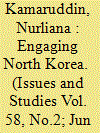

|
|
|
|
|
| Summary/Abstract |
The assassination of Kim Jong Nam in 2017 brought about a significant change in the diplomatic relationship between Malaysia and North Korea. Although diplomatic relations between the two countries were downgraded due to the incident, current changes would likely encourage the resumption of diplomatic ties. This study applies a poliheuristic decision-making analysis of Malaysia’s diplomatic relations with North Korea. It argues that Malaysia’s choice to establish diplomatic ties with North Korea was made consistent with the strong sense of neutrality that has shaped Malaysia’s foreign policy. Despite the increased security threat North Korea is perceived as globally, it was not until the assassination attempt that there was any regression in diplomatic relations between the two countries. Poliheuristic theory can also be utilized to explain why Malaysia will most likely proceed with reopening the Malaysian Embassy in Pyongyang as this is an alternative that would present Malaysia with continued gain in consideration of both its emphasis on diplomacy and neutrality in its foreign policy.
|
|
|
|
|
|
|
|
|
|
|
|
|
|
|
|
| 6 |
ID:
065703
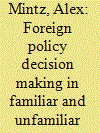

|
|
|
| 7 |
ID:
065698
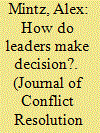

|
|
|
| 8 |
ID:
065701
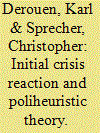

|
|
|
| 9 |
ID:
083749
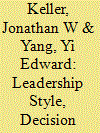

|
|
|
|
|
| Publication |
2008.
|
| Summary/Abstract |
The poliheuristic (PH) theory of decision making has made important contributions to our understanding of political decision making but remains silent about certain key aspects of the decision process. Specifically, PH theory contends that leaders screen out politically unacceptable options, but it provides no guidance on (1) the crucial threshold at which leaders reject options as politically unacceptable, (2) whether this threshold varies across leaders and situations, and, (3) if so, which factors shape variation in this threshold. We integrate PH theory with research on political leadership and decision context and derive hypotheses from this modified PH framework. An experimental test reveals that situational context and leadership style affect both (1) the ``noncompensatory threshold'' at which decision makers reject options as politically unacceptable and (2) how much decision makers rely on their constituents' views in making policy choices. We conclude that a modified PH theory incorporating these insights will have enhanced explanatory and predictive power.
|
|
|
|
|
|
|
|
|
|
|
|
|
|
|
|
| 10 |
ID:
065700
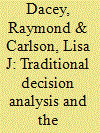

|
|
|